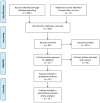Association of single nucleotide polymorphisms in ADIPOQ gene with risk of hypertension: a systematic review and meta-analysis
- PMID: 34853633
- PMCID: PMC8611228
Association of single nucleotide polymorphisms in ADIPOQ gene with risk of hypertension: a systematic review and meta-analysis
Abstract
Background: Hypertension has been continuing to be a major contributor to the global burden of disease and to the global mortality, leading to over 10 million deaths each year. The purpose of this study was to investigate the association between Adiponectin gene polymorphism with Essential hypertension (EH).
Methods: PubMed, EMbase, the Cochrane Library, and China National Knowledge Infrastructure (CNKI) were searched independently by two investigators. Pooled odds ratios and 95% confidence intervals were calculated to estimate the associations of Adiponectin polymorphism with EH.
Results: Thirteen studies with 3198 cases and 3076 controls for meta-analysis (MA) were included in present study. Pooled results showed that rs2241766 polymorphism is associated with the risk of EH in the allelic model (G vs. T: OR=1.10; 95% CI, 1.01-1.21). In the <40 years subgroup, rs2241766 polymorphism is associated with the risk of EH in allele model (G vs. T: OR=1.43; 95% CI, 1.06-1.94), recessive model (GG vs. GT + TT: OR=5.26, 95% CI=1.47-18.76), homozygous model of GG (GG vs.TT: OR=5.27, 95% CI=1.47-18.95), and rs266729 in recessive model (GG vs. GT + TT: OR=2.33, 95% CI=1.33-4.08).
Conclusions: Our meta-analysis results show that the rs2241766 polymorphism is associated with the risk of hypertension. There still need a larger sample with better design to verify.
Keywords: Adiponectin; hypertension; meta-analysis; polymorphisms.
IJMEG Copyright © 2021.
Conflict of interest statement
None.
Figures
References
-
- Forouzanfar MH, Liu P, Roth GA, Ng M, Biryukov S, Marczak L, Alexander L, Estep K, Hassen Abate K, Akinyemiju TF, Ali R, Alvis-Guzman N, Azzopardi P, Banerjee A, Barnighausen T, Basu A, Bekele T, Bennett DA, Biadgilign S, Catala-Lopez F, Feigin VL, Fernandes JC, Fischer F, Gebru AA, Gona P, Gupta R, Hankey GJ, Jonas JB, Judd SE, Khang YH, Khosravi A, Kim YJ, Kimokoti RW, Kokubo Y, Kolte D, Lopez A, Lotufo PA, Malekzadeh R, Melaku YA, Mensah GA, Misganaw A, Mokdad AH, Moran AE, Nawaz H, Neal B, Ngalesoni FN, Ohkubo T, Pourmalek F, Rafay A, Rai RK, Rojas-Rueda D, Sampson UK, Santos IS, Sawhney M, Schutte AE, Sepanlou SG, Shifa GT, Shiue I, Tedla BA, Thrift AG, Tonelli M, Truelsen T, Tsilimparis N, Ukwaja KN, Uthman OA, Vasankari T, Venketasubramanian N, Vlassov VV, Vos T, Westerman R, Yan LL, Yano Y, Yonemoto N, Zaki ME, Murray CJ. Global burden of hypertension and systolic blood pressure of at least 110 to 115 mmHg, 1990-2015. JAMA. 2017;317:165–182. - PubMed
-
- GBD 2017 Risk Factor Collaborators. Global, regional, and national comparative risk assessment of 84 behavioural, environmental and occupational, and metabolic risks or clusters of risks for 195 countries and territories, 1990-2017: a systematic analysis for the global burden of disease study 2017. Lancet. 2018;392:1923–1994. - PMC - PubMed
-
- Harrison M, Maresso K, Broeckel U. Genetic determinants of hypertension: an update. Curr Hypertens Rep. 2008;10:488–495. - PubMed
-
- Rhodes CJ, Batai K, Bleda M, Haimel M, Southgate L, Germain M, Pauciulo MW, Hadinnapola C, Aman J, Girerd B, Arora A, Knight J, Hanscombe KB, Karnes JH, Kaakinen M, Gall H, Ulrich A, Harbaum L, Cebola I, Ferrer J, Lutz K, Swietlik EM, Ahmad F, Amouyel P, Archer SL, Argula R, Austin ED, Badesch D, Bakshi S, Barnett C, Benza R, Bhatt N, Bogaard HJ, Burger CD, Chakinala M, Church C, Coghlan JG, Condliffe R, Corris PA, Danesino C, Debette S, Elliott CG, Elwing J, Eyries M, Fortin T, Franke A, Frantz RP, Frost A, Garcia JGN, Ghio S, Ghofrani HA, Gibbs JSR, Harley J, He H, Hill NS, Hirsch R, Houweling AC, Howard LS, Ivy D, Kiely DG, Klinger J, Kovacs G, Lahm T, Laudes M, Machado RD, MacKenzie Ross RV, Marsolo K, Martin LJ, Moledina S, Montani D, Nathan SD, Newnham M, Olschewski A, Olschewski H, Oudiz RJ, Ouwehand WH, Peacock AJ, Pepke-Zaba J, Rehman Z, Robbins I, Roden DM, Rosenzweig EB, Saydain G, Scelsi L, Schilz R, Seeger W, Shaffer CM, Simms RW, Simon M, Sitbon O, Suntharalingam J, Tang H, Tchourbanov AY, Thenappan T, Torres F, Toshner MR, Treacy CM, Vonk Noordegraaf A, Waisfisz Q, Walsworth AK, Walter RE, Wharton J, White RJ, Wilt J, Wort SJ, Yung D, Lawrie A, Humbert M, Soubrier F, Trégouët DA, Prokopenko I, Kittles R, Gräf S, Nichols WC, Trembath RC, Desai AA, Morrell NW, Wilkins MR UK NIHR BioResource Rare Diseases Consortium; UK PAH Cohort Study Consortium; US PAH Biobank Consortium. Genetic determinants of risk in pulmonary arterial hypertension: international genome-wide association studies and meta-analysis. Lancet Respir Med. 2019;7:227–238. - PMC - PubMed
Publication types
LinkOut - more resources
Full Text Sources
Miscellaneous


